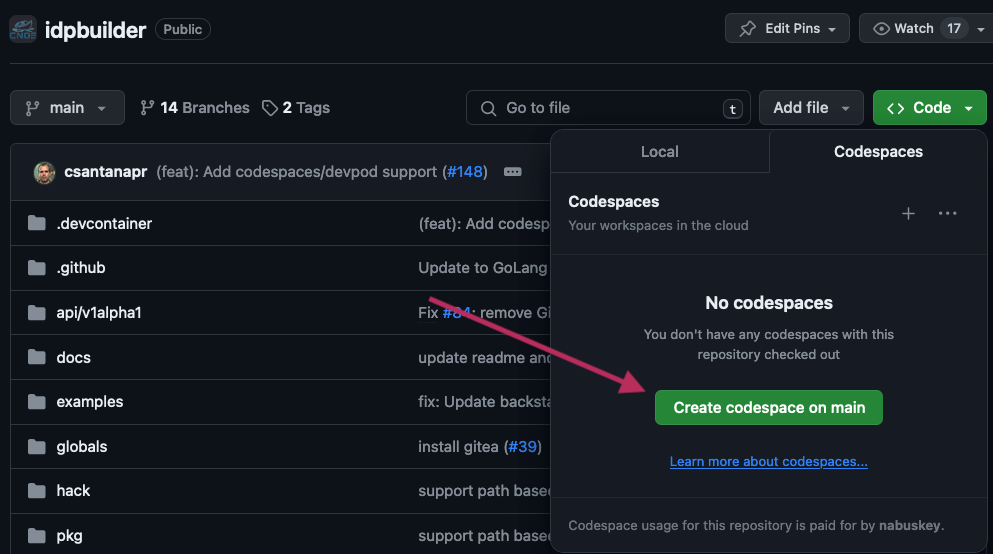Set up IDP on Local Machine
About
Introduction
idpBuilder is a powerful tool that enables you to easily spin up a complete internal developer platform (IDP) on your local machine.
Go to idpbuilder Overview page to get more details on the concepts.
Running ipdbuilder in local machine
A container engine is needed locally.
- Docker desktop is supported.
- Podman desktop is not supported however idpbuilder can create a cluster using rootful. You need tp set the
DOCKER_HOSTenv var property usingpodmanto let idpbuilder to talk with the engine (e.gexport DOCKER_HOST="unix:///var/run/docker.sock")
Option 1: Using Bash Script
You can execute the following bash script to get started with a running version of the idpBuilder (inspect the script first if you have concerns):
$curl -fsSL https://raw.githubusercontent.com/cnoe-io/idpbuilder/main/hack/install.sh | bash
verify a successful installation by running the following command and inspecting the output for the right version:
$idpbuilder version
Option 2: Manual installation
You can run the following commands for a manual installation:
$version=$(curl -Ls -o /dev/null -w %{url_effective} https://github.com/cnoe-io/idpbuilder/releases/latest)$version=${version##*/}$curl -L -o ./idpbuilder.tar.gz "https://github.com/cnoe-io/idpbuilder/releases/download/${version}/idpbuilder-$(uname | awk '{print tolower($0)}')-$(uname -m | sed 's/x86_64/amd64/').tar.gz"$tar xzf idpbuilder.tar.gz$./idpbuilder version# example output# idpbuilder 0.4.1 go1.21.5 linux/amd64
Option 3: Release page binary
The easiest way to get started is to grab the idpbuilder binary for your platform and run it. You can visit our nightly releases page to download the version for your system, or run the following commands:
$arch=$(if [[ "$(uname -m)" == "x86_64" ]]; then echo "amd64"; else uname -m; fi)$os=$(uname -s | tr '[:upper:]' '[:lower:]')$idpbuilder_latest_tag=$(curl --silent "https://api.github.com/repos/cnoe-io/idpbuilder/releases/latest" | grep '"tag_name":' | sed -E 's/.*"([^"]+)".*/\1/')$curl -LO https://github.com/cnoe-io/idpbuilder/releases/download/$idpbuilder_latest_tag/idpbuilder-$os-$arch.tar.gz$tar xvzf idpbuilder-$os-$arch.tar.gz
Running ipdbuilder in Codespaces
You can run idpbuilder in Codespaces.
Create a Codespaces instance. 
-
Wait for it to be ready. It may take several minutes.
-
Get the latest release of idpbuilder:
$version=$(curl -Ls -o /dev/null -w %{url_effective} https://github.com/cnoe-io/idpbuilder/releases/latest)$version=${version##*/}$curl -L -o ./idpbuilder.tar.gz "https://github.com/cnoe-io/idpbuilder/releases/download/${version}/idpbuilder-$(uname | awk '{print tolower($0)}')-$(uname -m | sed 's/x86_64/amd64/').tar.gz"$tar xzf idpbuilder.tar.gz -
Run idpbuilder:
$idpbuilder create --protocol http \--host ${CODESPACE_NAME}-8080.${GITHUB_CODESPACES_PORT_FORWARDING_DOMAIN} \--port 8080 --use-path-routing -
Because Codespaces gives a single externally routable host name for an instance, idpbuilder must deploy with path based routing. This means ArgoCD and Gitea UIs are given with the following commands.
- ArgoCD:
echo https://${CODESPACE_NAME}-8080.${GITHUB_CODESPACES_PORT_FORWARDING_DOMAIN}/argocd - Gitea:
echo https://${CODESPACE_NAME}-8080.${GITHUB_CODESPACES_PORT_FORWARDING_DOMAIN}/gitea
Note that not all examples work with path based routing.
- ArgoCD:
Codespaces tips and tricks
Codespaces tips and tricks
By default all port forwarding in a Codespace environment is private which means that you will not be able to access the OCI registry directly from your local machine's CLI.
You can however use the github CLI to port-forward a port on your local machine to the codespace which is running the OCI registry and listening on port 8443.
To do this, make sure you have the latest github cli installed. Instructions here: [https://github.com/cli/cli#installation] (https://github.com/cli/cli#installation)
Next you will need to login to github and give your CLI access to the codespace:
$gh auth login -h github.com -s codespace
Follow the prompts to perform the auth via your local machine's browser and make sure to choose the codespace you are running idpbuilder in.
$gh auth login -h github.com -s codespace! First copy your one-time code: 0076-1071Press Enter to open https://github.com/login/device in your browser...Opening in existing browser session.✓ Authentication complete.
List the ports on your codespace:
$gh codespace ports? Choose codespace: cnoe-io/idpbuilder [main*]: expert chainsawLABEL PORT VISIBILITY BROWSE URL8443 private https://expert-chainsaw-7vjwj6qqgcprjp-8443.app.github.dev37065 private https://expert-chainsaw-7vjwj6qqgcprjp-37065.app.github.dev
Then perform the port-forward. Make sure to use the same port that the codespace has listed in it's port column. Likely this is 8443 which is the default at the time of this writing.
$gh codespace ports forward 8443:8443 -c expert-chainsaw-7vjwj6qqgcprjp
If you see a message like the following then you may already have another service on your local machine that is listening on 8443. Make sure to shut it down. (Maybe you were running idpbuilder locally as well?)
failed to listen to local port over tcp: listen tcp :8443: bind: address already in use
Once you have setup the port-forward you will see the following:
$gh codespace ports forward 8443:8443 -c expert-chainsaw-7vjwj6qqgcprjpForwarding ports: remote 8443 <=> local 8443
You can now connect directly to the registry hosted on idpbuilder in your codespace environment.
$docker login cnoe.localtest.me:8443/giteaAuthenticating with existing credentials...Stored credentials invalid or expiredUsername (giteaAdmin): giteaadminPassword:WARNING! Your password will be stored unencrypted in /home/sanforj/.docker/config.json.Configure a credential helper to remove this warning. Seehttps://docs.docker.com/engine/reference/commandline/login/#credential-storesLogin Succeeded
IMPORTANT! As you may have noticed, you must use cnoe.localtest.me:8443 (or whatever port number was listed) as the registry name.
This will allow for compatibility with the oci clients that are working in the codespace as well as those that are running on the idpbuilder kubernetes cluster.
As long as you tag your images and push them to cnoe.localtest.me:8443/gitea/giteaadmin/imagename:tag they will be able to be referenced on your local machine, on the cli within the codespace and on the idbpuilder k8s cluster at that same registry/repo/imagename:tag location.
Example mirroring Alpine image
So to be clear. On your local machine you have to tag your images appropriately like so:
$docker tag alpine:latest cnoe.localtest.me:8443/gitea/giteaadmin/alpine:latest
Then you can push once your port-forwarding is working:
$docker push cnoe.localtest.me:8443/gitea/giteaadmin/alpine:latestThe push refers to repository [cnoe.localtest.me:8443/gitea/giteaadmin/alpine]3e01818d79cd: Layer already existslatest: digest: sha256:fa7042902b0e812e73bbee26a6918a6138ccf6d7ecf1746e1488c0bd76cf1f34 size: 527
Then on the cli inside your codespace you can pull it:
$docker pull cnoe.localtest.me:8443/gitea/giteaadmin/alpine:latestlatest: Pulling from gitea/giteaadmin/alpineDigest: sha256:fa7042902b0e812e73bbee26a6918a6138ccf6d7ecf1746e1488c0bd76cf1f34Status: Image is up to date for cnoe.localtest.me:8443/gitea/giteaadmin/alpine:latestcnoe.localtest.me:8443/gitea/giteaadmin/alpine:latest
And when you run an image in your idpbuilder k8s cluster just make sure to reference it at the same location:
apiVersion: v1
kind: Pod
metadata:
name: alpine-from-local-registry
spec:
containers:
- name: alpine-from-local-registry
image: cnoe.localtest.me:8443/gitea/giteaadmin/alpine:latest
restartPolicy: Never